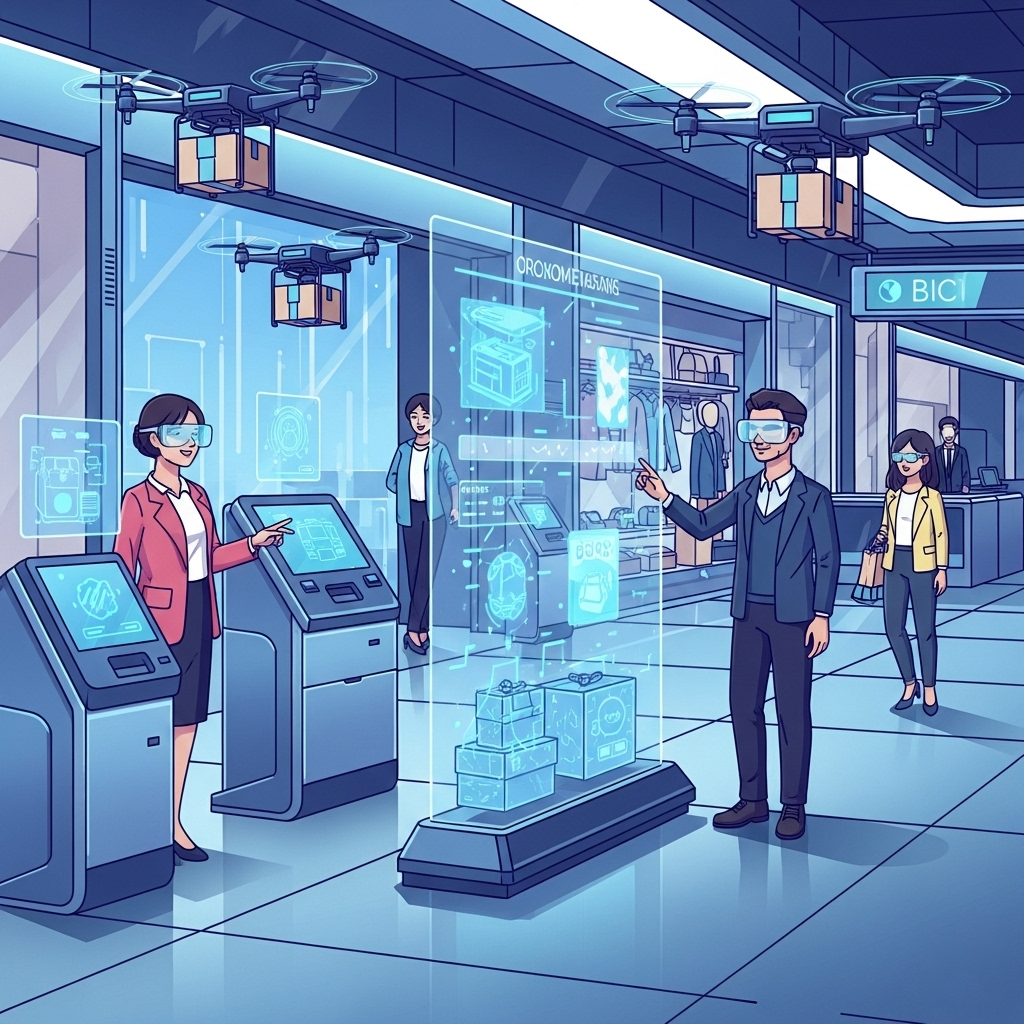
The Future of Retail: How Technology is Revolutionizing the Shopping Experience
The retail landscape is undergoing a dramatic transformation, driven by rapid advancements in technology. The traditional model of brick-and-mortar stores is evolving, with online shopping becoming increasingly sophisticated and new technologies blurring the lines between the physical and digital worlds. The future of retail is about creating seamless, personalized, and engaging experiences that cater to the evolving needs and expectations of consumers.
The Rise of E-commerce and Omnichannel Experiences
E-commerce has revolutionized the way we shop, offering convenience, choice, and accessibility. The future of retail will be defined by omnichannel experiences, seamlessly integrating online and offline channels to create a unified and consistent shopping journey.
- Personalized Recommendations: AI-powered algorithms analyze consumer data to provide highly personalized product recommendations, enhancing discovery and driving sales.
- Virtual Try-On and Augmented Reality (AR): AR technology allows customers to virtually “try on” clothes, accessories, and makeup, improving the online shopping experience and reducing returns.
- Interactive Store Displays: Physical stores will become more interactive, with digital displays providing product information, personalized offers, and engaging content.
- Seamless Checkout: Mobile payment systems and contactless checkout will make the in-store shopping experience faster and more convenient.
- Click-and-Collect and Curbside Pickup: These options offer flexibility and convenience, allowing customers to purchase online and pick up their orders in-store or curbside.
Artificial Intelligence (AI) and Data-Driven Retail
AI is transforming retail operations, enabling businesses to optimize processes, personalize customer interactions, and predict future trends.
- Trend Forecasting: AI algorithms analyze vast amounts of data from social media, fashion blogs, and sales figures to predict emerging trends, allowing retailers to stay ahead of the curve.
- Inventory Management: AI-powered systems optimize inventory levels, minimizing overstocking and stockouts, and ensuring that products are available when and where customers want them.
- Chatbots and Virtual Assistants: AI-powered chatbots provide instant customer service, answering questions, providing product information, and assisting with purchases.
- Dynamic Pricing: AI algorithms adjust prices in real-time based on demand, competitor pricing, and other factors, maximizing revenue and profitability.
The Metaverse and Virtual Retail
The emergence of the metaverse is creating entirely new possibilities for retail, allowing brands to engage with customers in immersive and interactive virtual environments.
- Virtual Stores: Brands are creating virtual stores in the metaverse, offering a new way for customers to browse, explore, and purchase products.
- Digital Fashion: The metaverse is driving the growth of digital fashion, with avatars needing clothing and accessories to express their identity in virtual worlds.
- NFTs and Blockchain: Non-Fungible Tokens (NFTs) are being used to represent ownership of digital and physical fashion items, creating new opportunities for exclusivity and collectibility.
- Immersive Experiences: The metaverse allows brands to create immersive experiences, such as virtual fashion shows and interactive games, that engage customers in new and exciting ways.
Robotics and Automation
Robotics and automation are streamlining retail operations, improving efficiency, and reducing costs.
- Automated Warehouses: Robots are used to pick, pack, and ship orders in warehouses, speeding up fulfillment and reducing errors.
- In-Store Robots: Robots can assist customers in stores, providing product information, guiding them to specific items, and even processing transactions.
- Delivery Drones: Drones are being used to deliver packages quickly and efficiently, particularly in urban areas.
Sustainability and Ethical Practices
Consumers are increasingly demanding sustainable and ethical practices from retailers. The future of retail will be defined by a commitment to environmental responsibility and social justice.
- Transparency and Traceability: Blockchain technology is being used to track the journey of products from raw materials to the consumer, ensuring transparency and ethical sourcing.
- Circular Economy: Retailers are embracing circular economy principles, promoting product repair, resale, and recycling, and reducing waste.
- Sustainable Materials: Retailers are prioritizing the use of sustainable materials, such as organic cotton, recycled fabrics, and innovative bio-based materials.
- Ethical Labor Practices: Retailers are committed to ensuring fair wages and safe working conditions for garment workers throughout their supply chains.
The Future of the Physical Store
Despite the growth of e-commerce, the physical store will continue to play an important role in the future of retail. However, the store of the future will be different from the traditional model.
- Experiential Retail: Physical stores will become more experiential, offering unique and engaging activities that cannot be replicated online.
- Showrooms and Brand Experiences: Some stores will focus on showcasing products and providing brand experiences, rather than just selling merchandise.
- Community Hubs: Stores will become community hubs, hosting events, workshops, and gatherings that bring people together.
- Technology Integration: Physical stores will integrate technology seamlessly, offering personalized service, interactive displays, and a connected shopping experience.
The Personalized Shopping Journey
The future of retail is about creating personalized shopping journeys that cater to the unique needs and preferences of each customer.
- AI-Powered Styling: AI algorithms will provide personalized styling advice, suggesting outfits and accessories based on a customer’s style profile and purchase history.
- Customized Products: Technology will enable retailers to offer customized products, from made-to-measure clothing to personalized beauty products.
- Subscription Services: Subscription services will curate and deliver personalized selections of products to customers on a regular basis.
- Loyalty Programs: Loyalty programs will reward customers for their engagement and purchases, offering exclusive benefits and personalized offers.
The Future of Retail: An Evolving Landscape
The future of retail is an exciting and rapidly evolving landscape. Technology is transforming every aspect of the shopping experience, creating new opportunities for retailers to engage with customers, personalize their interactions, and build lasting relationships. As consumer expectations continue to evolve, retailers must embrace innovation and adapt to the changing landscape to thrive in the future of retail.



Add comment